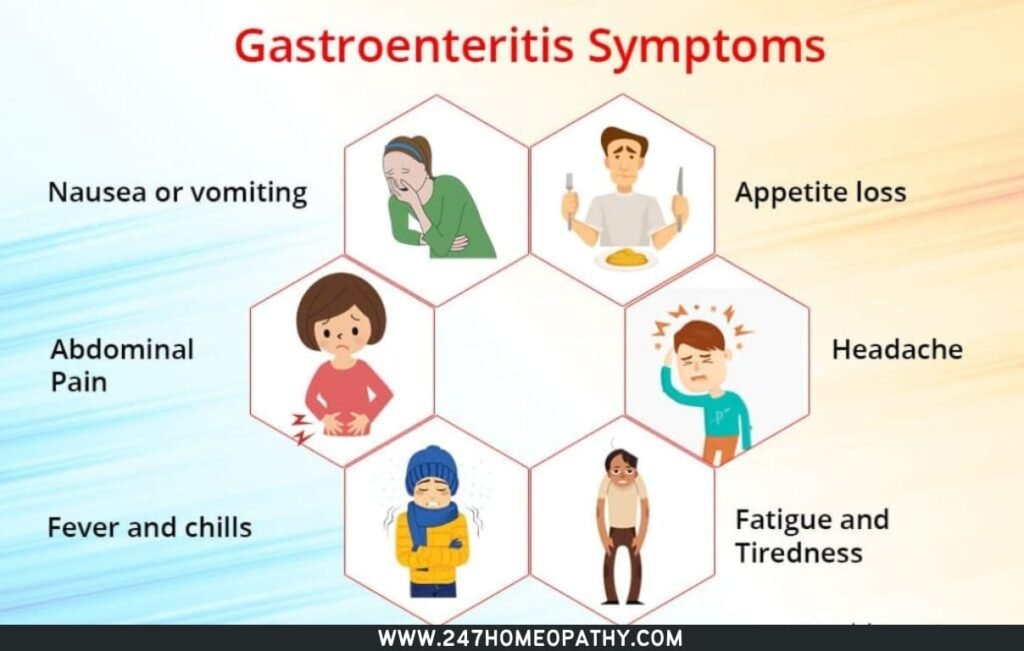
Gastroenteritis
Gastroenteritis is also known as stomach flu. Gastroenteritis means there is infection or inflammation of the stomach and intestine that is characterized by sudden onset of vomiting and diarrhea. Gastroenteritis is caused by having food or water that has been contaminated with bacteria, viruses, parasites, and fungus.
Patients restore health usually after 6-7 days if there are no associated illnesses. But it can be fatal in children, infants, or people where the immune system is already compromised because of other illnesses.
Causes:
Gastroenteritis is mainly caused by viruses, bacteria’s, fungus, and parasites.
It can occur after having contaminated food or having close contact with the person suffering from stomach flu.
Viruses:
Viruses like rotavirus are the commonest cause of stomach flu in infants or children.
In adults, norovirus and campylobacter are the common causes of flu. Adenovirus or coronavirus can also cause infection of the stomach and intestine.
Bacterial:
Campylobacter jejuni is the most common cause of bacterial gastroenteritis. If food is contaminated with bacteria and leaves
that food at room temperature where bacteria multiply and increase the risk of infection after having that food. Uncooked, raw food like meat, seafood, eggs, unpasteurized milk can cause stomach illness.
Parasitic:
A number of parasites like giardia lamblia or entamoeba histolytica and cryptosporidium also can cause the stomach flu.
Symptoms:
- Diarrhea with no blood is a marked symptom of viral gastroenteritis.
- Abdominal pain and cramps are associated with diarrhea.
- Nausea and vomiting.
- Loss of appetite especially in children.
- In gastroenteritis fever is mild but there is body pain and weakness of the body followed by chills.
- Viral gastroenteritis lasts for 6-7 days and resolves afterward.
- Diarrhea with blood in the stool usually occurs in bacterial gastroenteritis.
- Weight loss
- Headache
- Weakness
Dehydration or electrolyte imbalance that can cause complications in the children especially.
Risk factors:
People living in crowded places or who are travelers are at higher risk to get infections due to consuming contaminated food or water.
Infants and children are prone because of underdeveloped immunity.
People with prolonged use of antibiotics are at higher risk of stomach flu.
People with poor hygiene are prone to get stomach flu.
Complications:
Dehydration
Abdominal pain
Muscle ache
Fatigue
Weakness
Low blood pressure
Dryness of the skin.
Diagnosis:
It can be diagnosed clinically on the basis of clinical features that patients are representing.
A stool culture to rule out microorganisms.
Blood test to see the infection present.
Kidney functions test and electrolytes chart.
Preventions:
Wash hands with soap before having a meal or after using the washroom/toilet.
Wash hands and vegetables or fruits before cooking them.
Food should be cooked thoroughly.
Hygiene should be maintained. Clean utensils, kitchen equipment regularly.
Clean the washroom toilet regularly.
Homeopathy medicines:
Veratrum album: this is well marked for all kinds of diarrhea with nausea and vomiting, cold shivers, and sweat. Cramps in the abdomen with weakness of the body. Pain in the lower extremities. Extreme coldness of the body with the desire to ice-cold water and food. Aversion to warm food.
Podophyllum: podophyllum is well indicated in the traveler’s diarrhea. Diarrhea and vomiting are offensive. Symptoms usually get worse in the morning. There is a gurgling sound in the abdomen. Diarrhea after eating. Tenderness and soreness feeling in the right side of the abdomen.
Antimonium crudum: antimonium corundum is well indicated for gastroenteritis where there is vomiting soon after eating or drinking. The tongue is thickly white coated. Regurgitation or belching after overeating indigestible food.
Pulsatilla: pulsatilla is the best remedy for the infection of the stomach and intestines after eating rich fat food or greasy food and cold drinks. Diarrhea occurs usually at night with heartburn and bad taste from the mouth. The sensation of heaviness in the abdomen or there can be cramps in the abdomen. Aversion to fatty food because of indigestion problems.